Opinions on how hard and easy it is to build muscle seem to belong to one of two camps. On one side, there are the people who find it smooth sailing. On the other, there are those who find it impossible. So how easy is gaining muscle really?
Beginners can gain muscle relatively easily. However, success is largely dependent on following an effective workout and nutrition program. Additionally, it can take many months and even years of disciplined training and dieting to build a significant amount of muscle.
I’m an ex-skinny guy myself, weighing in at a measly 140lbs just 5 years ago.
Now, I’m weighing 165lbs with 12% bodyfat.
I may not be the biggest guy at the gym, but I certainly know how to dig myself out of the “skinny” trenches!
Below, I’ll share my opinions on just how difficult it is (or isn’t!).

- How Easy Or Hard Gaining Muscle Can Be
- Crash Course On How Muscle Is Built
- Why Beginners Can Find Gaining Muscle Easy
- How Quickly Beginners Can Gain Muscle
- 9 Tips To Make Gaining Muscle Easy
- 1) Choose exercises carefully.
- 2) Do 8-15 reps per set.
- 3) Complete 3-5 sets per muscle per workout.
- 4) Use a weight that's challenging for each set.
- 5) Train each muscle group twice per week.
- 6) Eat at least 1g of protein per lb of bodyweight per day.
- 7) Do not ignore carbohydrate and fat intake.
- 8) Eat a caloric surplus.
- 9) Get at least 8 hours of sleep every night.
- Conclusion
How Easy Or Hard Gaining Muscle Can Be
Gaining muscle is not a hard process. However, it can take months to years of disciplined training and dieting to build a significant amount of lean mass. Most people find this to be the most difficult aspect of building a more muscular physique.

Speaking from personal experience, the muscle-building journey can be daunting at first.
That’s because it still feels like a farfetched dream.
You don’t know what you’re doing at this point so the journey to building your first 10lbs of muscle seems like an impossible endeavor.
I’ve been on the uphill slog without any results.
And yes, it can be extremely demotivating.
But trust me.
Gaining muscle, also known as hypertrophy, is by no means a “difficult” thing to do.
In fact, most people can achieve a body they are proud of.
You just need to follow a good workout program and diet plan.
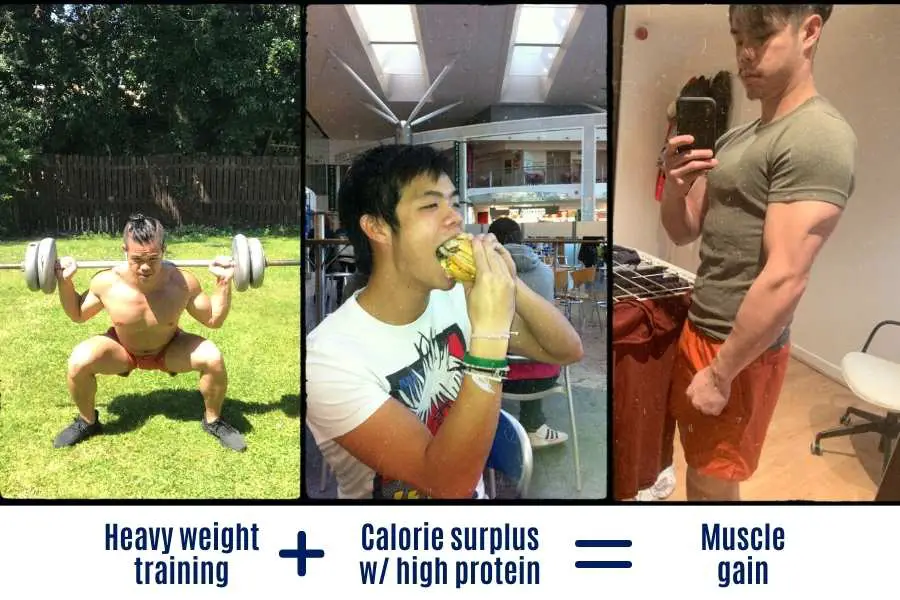
A good hypertrophy-based program revolves around lifting progressively heavier loads on the compound movements and eating a caloric surplus with a high protein intake (more on this below!).
Doing this will make the muscle-building journey A LOT easier.
In this case, it’s only a matter of time, discipline, and consistent training/dieting for you to build a noticeable amount of muscle.
It took me around 18 months to transform from skinny to truly muscular.
But the converse is also true.
If you don’t follow a well-planned training and nutrition plan, then gaining muscle can be extremely hard.
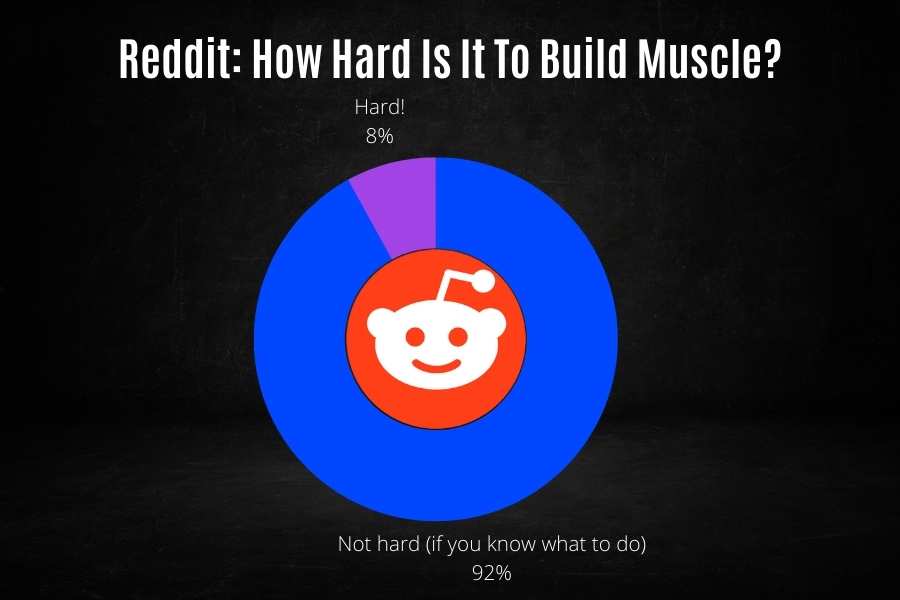
In support of this, 92% of this Reddit thread (which asked “how hard is it to build muscle”) agreed that building muscle is not hard if you know what to do.
Yup, you’re not genetically doomed to be skinny for the rest of your life even though you may feel like that!
Crash Course On How Muscle Is Built
In order to truly understand why most people can build muscle, it helps to understand HOW muscle is built in the first place.
That’s what I’ll cover in this section.
Here is the basic mechanism behind muscle growth:
- Intense resistance training. This simply refers to anything that presents an external force (i.e. resistance) for your muscles to push or pull against. Resistance should be heavy (i.e. intense) enough to fatigue your muscles. This can take the form of body weight, band, or free weight training.
- Muscular microdamage forms. This is also called microtears or microtrauma. It’s basically microscopic injuries to your muscle. Microdamage will only form if you challenge your muscles with weights that are heavy enough. So don’t expect to build muscle by lifting light weights that don’t fatigue your muscles!
- A repair process initiates. This is the natural response of your body. It uses nutritional resources from the food you eat to repair your muscles. Macronutrients are the most important food types when it comes to repairing and building muscle. These include calories, protein, fats, and carbohydrates. Therefore it’s essential to eat enough macronutrients if you’re trying to build muscle (more on this below!).
- Muscle recovery and growth. Repeated cycles of microdamage and repair cause your muscles to enlarge. This is an adaptive process. In other words, your muscles will grow back bigger and stronger the more you train and eat.
You can check out my other post for an in-depth skinny guy workout program to build muscle at home and avoid all the mistakes I made as a beginner trying to build muscle!
Why Beginners Can Find Gaining Muscle Easy
Beginners can build muscle relatively fast and easily. This is due to the “newbie gains” phenomenon which can last for around 1 year. It refers to the initial period of rapid muscle and strength gains experienced by beginners who have never trained before.
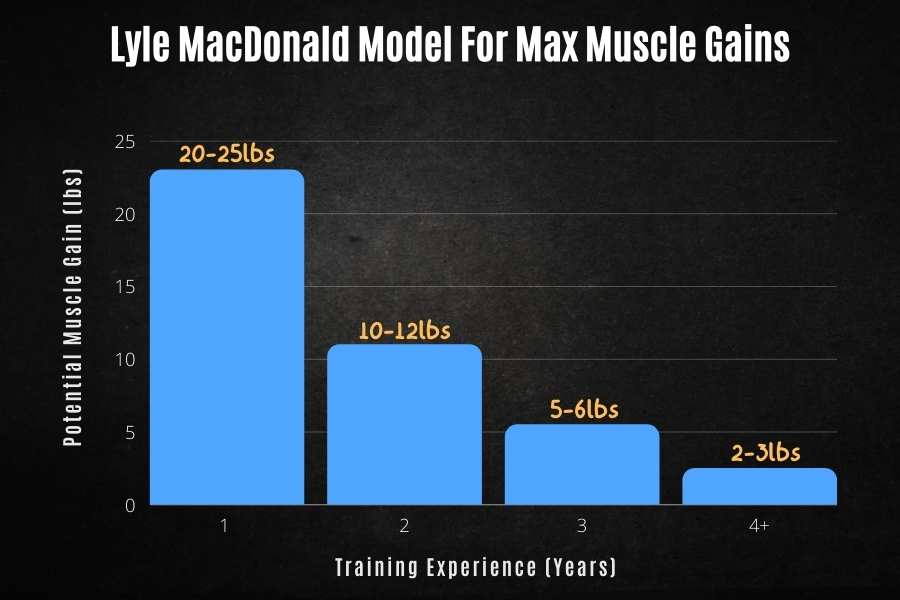
If you’re reading this article, then I can probably assume that you’re a beginner.
Well, I have good news for you!
Newbie gains, also called noob gains, are a Godsend for beginners looking to gain muscle quickly and easily.
You know in video games where beginners often get fast-track bonuses just because they’re new to the game?
Well, that’s what newbie gains are!
It describes the first 6-12 months (sometimes even longer) of rapid muscle gain when you first start training.
Why do newb gains occur?
Well, beginners have what’s called “naive” muscles; they’ve never experienced proper training stimuli.
So any kind of intense stimuli can have significant results on muscular growth.
Newb gains explain why some people can put on crazy amounts of muscle relatively easily. Don’t be surprised if you can gain 10lbs of lean mass or more in less than half a year!
And don’t worry, you can’t waste your newbie gains either.
It’s a continuous process that starts to dissipate the longer you’ve been training, EFFECTIVELY.
So, if for example, you follow a poor training and nutrition plan for a year, you’re still likely going to be able to benefit from newbie gains upon changing to a better program.
Awesome!
Thus, gaining muscle might be easier than you thought it would be!
How Quickly Beginners Can Gain Muscle
Beginners can gain around 1-2lbs of lean muscle per month. Total body weight can also be gained at a faster rate but anything over 2lbs per month is likely to be from fat and water weight. Experienced lifters gain muscle at a slower rate.
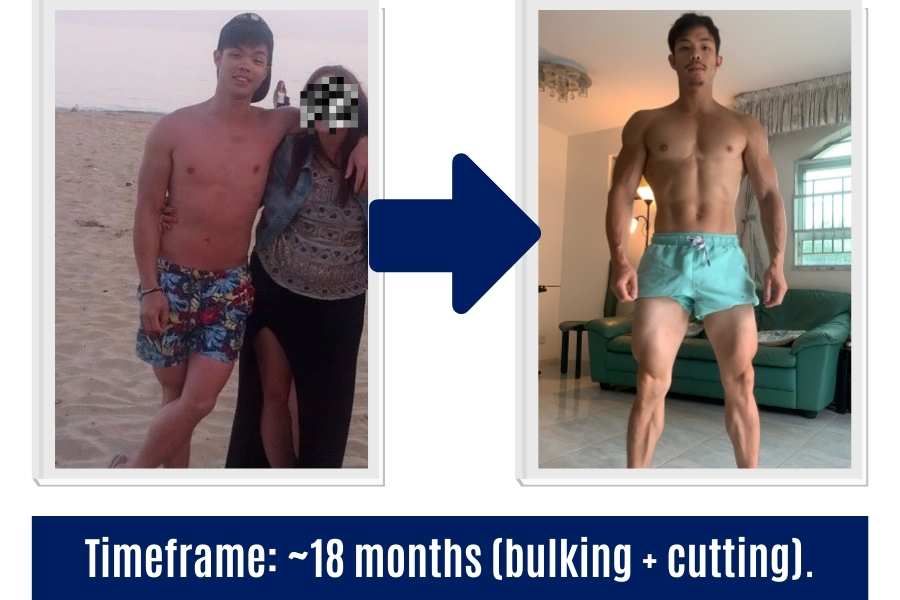
Most of us think it’s better to be skinny than muscular.
But just how long does it take to get bigger? In other words, how quickly and easily can you gain muscle as a newbie?
This question is hotly debated, but the consensus is that the maximum rate of muscle gain is around 2lbs per month.
But that’s for absolute beginners who are following an optimized training and diet program.
Intermediates and advanced lifters will find it harder to gain muscle, and the rate of muscle gain is around half to a quarter of that speed.
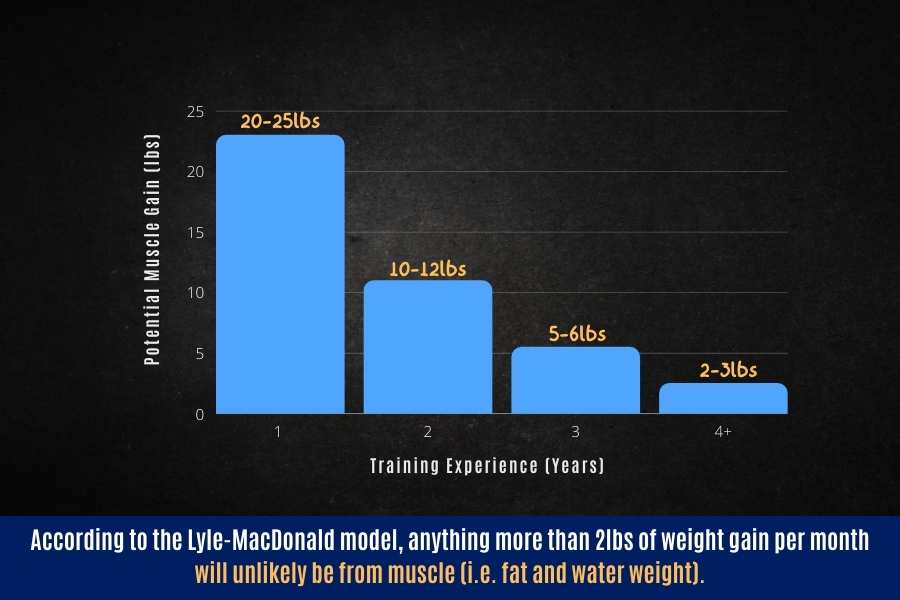
I gained 10lbs in 3 months.
At the time, I naively thought this to be pure muscle gains. But in retrospect, only around 3-6lbs was actual lean muscle mass whilst the remaining weight was mostly fat and water.
My point is this: it’s possible to gain more than 2lbs per month. But anything more than this will unlikely be muscle.
Still, gaining 10lbs in a few months will look highly noticeable (in a positive way). You’ll notice increased muscle definition and a broader body shape.
As a skinny beginner, you shouldn’t have to be worried about putting on fat.
You have a lot of leighway on that front!
You can check out my other post for more information on how long it takes a skinny person to put on muscle!
9 Tips To Make Gaining Muscle Easy
An optimized training program and nutrition plan make it easier to build muscle. Training should be focused on compound lifts using progressively heavier weights over time. Nutrition should be in a caloric surplus and at least 1 gram of protein per lb of bodyweight.
There’s a small genetic component to building muscle.
That’s because your natural hormonal balance as well as your natural body composition affects how quickly you can gain muscle.
People with higher testosterone and growth hormone levels and more natural muscle usually find it easier to build muscle.
But overall, most people will find that their lifestyle has the biggest impact on their ability to put on lean muscle.
Here are 9 training and diet tips that helped me put on muscle. Hopefully, these tips can help you gain muscle more easily!
1) Choose exercises carefully.
Isolation lifts like bicep curls are great for defining specific muscles. But you should focus on compound movements for overall muscle development. The big 5 compound lifts are a great place to start; squats, deadlifts, bench press, overhead press, and row.
2) Do 8-15 reps per set.
This is the ideal rep range for muscle hypertrophy (growth). I like to do 8-12 reps per set for compound movements and 12-15 reps per set for isolation movements. Make sure to use a weight that challenges you for each rep.
3) Complete 3-5 sets per muscle per workout.
Aim for 10-20 sets per muscle per week. Generally speaking, the more work you do the more muscle you’ll build. But only to a certain point. Studies have suggested that anything more than 6 sets per muscle per workout becomes “wasted” due to the law of diminishing returns. I usually stick to around 3-4 sets per muscle per workout to avoid these wasted sets and to prevent overtraining.
4) Use a weight that’s challenging for each set.
A rep range is only effective if you’re using a weight that fatigues your muscles. In other doing 8 reps will only help you to build muscle if those reps are heavy enough! Lift 80% of your 1-rep max for 8 reps , 50% of your 1-rep max for 15 reps, and 50-80% for anything between 8-15 reps. You can use the Strength Levels database to estimate your 1RM for each lift.
5) Train each muscle group twice per week.
Muscles respond better to growth when they are trained multiple times per week. This is called “training frequency”. And the ideal frequency is at least twice per week for muscle growth. So rather than cramming all your chest sets into a single day, split them up into 2 days with at least a day’s rest in between! You can check out my other article for signs you’re gaining muscle.
6) Eat at least 1g of protein per lb of bodyweight per day.
Optimal protein intake for muscle growth is hotly debated. Speaking from personal research and experience, I found 1g per lb of body weight per day works well. It’s enough protein to build muscle and it won’t break the bank either (protein is expensive). If you’re interested, you can check out my other article for tips on how to eat 140g of protein a day!
7) Do not ignore carbohydrate and fat intake.
In my opinion, carbs and fats aren’t as important as protein and calorie intake. I usually establish my protein and calories and make the rest up using carbs and fats. But as a good ballpark figure, aim for around ~2.5g of carbs and ~0.4g of fats per lb of bodyweight. Carbs fuel muscle growth and fats are important for hormone production.
8) Eat a caloric surplus.
This is essential to building muscle easily. I recommend a 5-15% calorie surplus for a lean bulk to build muscle quickly and easily (combined with heavy and regular weight training). You can even build muscle on maintenance calories but the process will be slower. You can find your maintenance calories on the TDEE calculator.
9) Get at least 8 hours of sleep every night.
By now, you should know that muscle grows during rest and recovery. So it comes as no surprise that most muscle growth also happens during sleep. Get your 8 hours of sleep per night for the quickest and easiest muscle gains! In fact, this 2017 study found that people who got less than 6 hours of sleep also had poorer muscle strength compared to those who got more than 8 hours!
Conclusion
I’ve (hopefully) explained if gaining muscle is easy or hard.
If you know how to plan an effective workout and nutrition program, then it really isn’t hard at all.
You can check out my skinny guy home workout program (linked at the end of section “crash course on how muscle is built”) for more details on how to plan a good workout!
But it does take a lot of time (months to years) and commitment to a following that program.
This kind of discipline si what most people find the hardest.
On the other hard, if you don’t know what you’re doing and have no discipline either, then you’ll probably find it very hard to build muscle!
How will you be undertaking your muscle transformation journey?
Feel free to send me a message if you have any questions! You can find my details on the “contact us” page.
You may also be interested in the downloadable Kalibre Blueprint PDF which details exactly how I gained 40lbs of lean muscle (it’s 100% free!). It details the exact exercises and nutrition (with printable worksheets) I used to go from skinny to ripped!
Thanks for reading guys!
Peace Out,
Kal
(Biochemistry BSc, Biomedical Sciences MSc, Ex-Skinny Guy)


